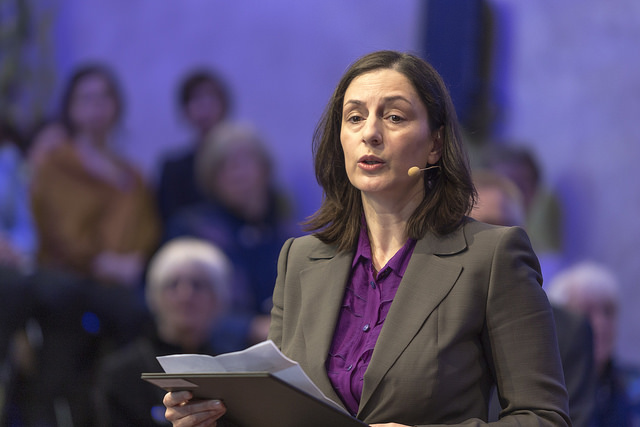
Stories Talk | Presentation Skills and Effective Storytelling
Stories Talk | Presentation Skills and Effective Storytelling
By Mia Kollia
Translated by Alexandros Theodoropoulos
She didn’t speak a word of German and had no contact with the academic sector there or any acquaintances that could help her.
She slowly learned the language and in early 1992 she received a scholarship to write her doctoral dissertation: "I often say that I owe it all to the German reunification as this scholarship came from an institute belonging to the Academy of Sciences of East Germany, which was dissolved in 1990 and created various research centers".
In the beginning, German language, the adaptation to a new way of life and thinking as well as the different mentality of a foreign culture, were all considerable obstacles for her. Specifically, regarding the language, her experience showed her that the earlier you start learning a foreign language, the better.
As a person gets older it becomes more difficult to learn correct grammar, vocabulary and pronunciation with ease. There are of course some exceptions.
“Of course, if we live some years in the country where the language we learn is spoken, it’s much better. But again, the result can vary greatly from person to person. Some people are really linguistic talents”.
It took her time to convince herself that she was definitely interested in staying in Germany to make a career there, and therefore that it was worth investing in her. There are many women in high positions in her field, but when she took her first chair in 2002, she was the only woman in the school. "I wouldn’t say it was the easiest thing”, she says.

However, she believes that there is no clear and absolute answer as to whether and to what extent it is easy or difficult for a Greek to become successful overseas. Each case is unique. Some careers are smoother than others. But it’s true for everyone that, apart from talent, strong will, hard work, patience and perseverance play a very important role.
Living for years in Germany, Artemis Alexiadou confirms that there is a great interest in ancient Greek. She’s met many people who have been taught ancient Greek even in school.
However, in very few universities there are centres of Modern Greek studies (only four). "Unlike English, or as we see now with Chinese, the reasons that lead someone to learn Greek have more to do with personal interest in our country and its culture and less with globalisation.
However, those who learn Greek, at the beginning, face grammar difficulties regarding the rules; it seems to them like the language has only irregular verbs. They also have problems with spelling”.
Many people claim that people usually think in their mother tongue. Artemis Alexiadou is not sure about that.
"I think in 3 languages, depending on the subject and sometimes it confuses me when I try to externalize my thoughts, as languages differ from each other. Of course I have been affected by the fact that I have been abroad for so many years; there is a linguistic term for this: attrition, wear and tear.
Many times Greek words do not come easily to me in conversation with Greeks. Sometimes I create new words by taking German or English words and adding Greek suffixes to them”.
This has been observed in many communities of the Greek Diaspora, for example in the US and Australia. Seaman studied the language of Greeks in Chicago and in his book of 1972 we find many examples like: bar, car, block, check, etc.
Also, sometimes, she forms sentences mixed with Greek and English words and does “staple” - a very normal behavior of bilingual speakers.
The experience of this great linguist has shown her that sometimes people want to express something but they end up expressing something different. This is possibly due to limited vocabulary, which of course doesn’t say much about language knowledge as a system.
"If someone has poor vocabulary, it does not necessarily mean that they don’t know the grammar rules. Other times it may have to do with the fact that we aren’t sure of what exactly we want to say. That is, we have various thoughts and we haven’t come up with one of them yet”.
#HERstory